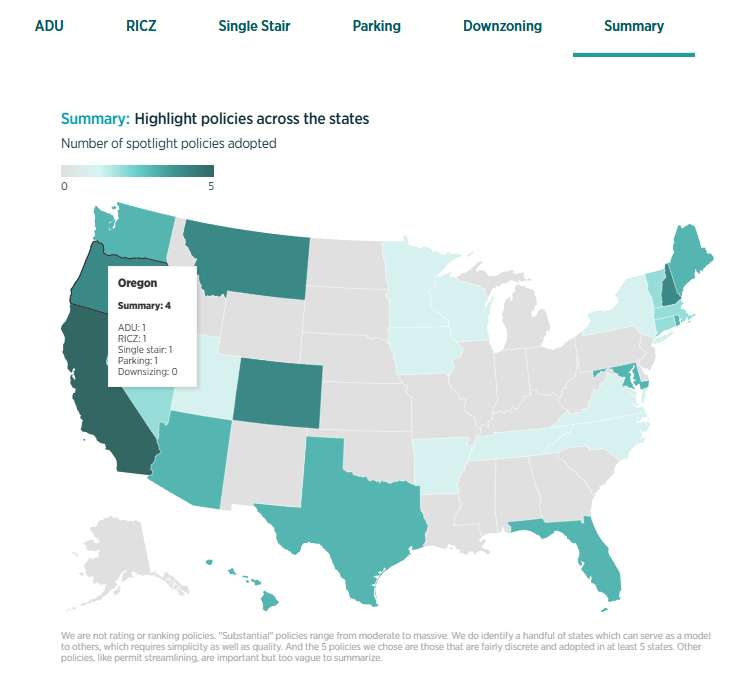Physical Address
304 North Cardinal St.
Dorchester Center, MA 02124
Physical Address
304 North Cardinal St.
Dorchester Center, MA 02124

With a hugely productive legislative season in 2025, pro-homes legislators are rapidly taking good ideas around the country. To keep track of it all, my team created a new set of interactive maps. You can see snapshots here: Our goal…

Check out Dan Bertolet’s review of the productive legislative year in Washington, where lawmakers preempted local parking, design, and unfunded inclusionary zoning requirements, among other things.
Builders seeking approval for proposed real estate developments must in almost all American localities navigate a complex series of required procedural steps, but for those who persevere and succeed in obtaining a permit, one eleventh-hour device can bring all those efforts to naught: the objector lawsuit. Easy to file but difficult to resolve, lawsuits by development opponents even when unsuccessful can delay projects by a year or more, playing havoc with cost and time estimates. Why are these suits so simple to start? The American common law system sets a low bar for a plaintiff to establish a right to maintain a lawsuit — known as “standing” — in which the mere claim that an injury has occurred, or even may occur in the future, is sufficient to keep a case moving along. Recognizing plaintiffs’ interest in having their day in court and the prudential consideration of having claims decided on their merits, judges will rarely find an injury to be so minor, indirect or speculative that it’s not worth judicial attention. While these considerations are important, they were not formulated with the expectation that they would be used to thwart individual exercise of property rights and the ordinary activities of civilized life. Some may recall the 1972 Supreme Court case of Sierra Club v. Morton, where the Court narrowly (4-3) decided that an environmental organization couldn’t rely upon alleged injuries to nature, rather than to the organization itself, to establish its right to sue to stop a planned ski resort, and which resulted in a dissent by Justice Douglas arguing for “conferral of standing upon environmental objects to sue for their own preservation.” The holding was quickly a moot point, as environmental organizations and other entities opposed to development recognized that they could recruit individual members who could allege […]
“Renting in Providence puts city councilors in precarious situations.” That was the Providence Journal’s leading headline a few days ago, as the legislature waited for Governor Daniel McKee to sign a pile of housing-related bills (Update: He signed them all). Rhode Island doesn’t have a superstar city to garner headlines, but it’s housing costs have mounted as growth has crawled to a standstill. But unlike in Montana and Washington, Rhode Island’s were largely procedural, aiming to lubricate the the gears of its existing institutions rather than directly preempting local regulations. House Speaker Joseph Shekarchi (D-Warwick), who championed the reforms, clearly drew on his professional expertise as a zoning attorney to identify areas for procedural streamlining. Specific and objective Six bills transmitted to the governor cover the general rules affecting most Rhode Island zoning procedures: S 1032 makes it easier to acquire discretionary development permission. Municipalities cannot enforce regulations that make it near-impossible to build on legacy lots that do not meet current regulatory standards. Municipalities can more quickly issue variances and modifications. (Rhode Island draws a unique distinction between minor and substantial variances, labeling the former “modifications” and subjecting them to a simpler process. A substantial variance must go before a board for approval; a modification can be approved administratively unless a neighbor objects. Municipalities must issue “specific and objective” criteria for “special use permits”, otherwise those use are automatically allowed as of right. That phrase – specific and objective – shows up again and again in Speaker Shekarchi’s bills. S 1033 requires that zoning be updated to match a municipality’s own Comprehensive Plan within 18 months of a new plan’s adoption. It also requires an annually updated “strategic plan” for each municipality, although the content and legal force of the strategic plans are unclear to me. S 1034 broadly […]
New York State’s Assembly is now in Democratic control. On many legislators wish list is to end the vacancy decontrol provisions that allow landlords to remove a unit from rent control if a tenant moves out and the unit rents for more than $2,000 per month. (for those of you not in New York, apartments over $2,000 per month is actually almost all apartments in Manhattan and desirable locations of Brooklyn & Queens) Crains – Change in state Senate control could hurt landlords “Roadblocks to considering such legislation have been removed,” says Ms. Rosenthal, who represents the Upper West Side. “This will be at the top of many people’s agenda come January.” Of course, this is going to scare the crap out of landlords and renters of market-rate units. “With all of the current uncertainty, why would you throw another obstacle in the way of even more investment in housing in the city,” asks Steven Spinola, president of the Real Estate Board of New York. Mr. Spinola is also confident that Senate Democrats will not act quickly on housing laws. “They’re going to have enough trouble dealing with fiscal problems,” Mr. Spinola says. Maybe our wise legislators will take the time to learn about the microeconomics of rent control…